July 5, 2025

The article titled "10 Essential Insights on ABA Therapist Jobs for 2025" underscores the remarkable growth and evolving landscape of job opportunities for Board Certified Behavior Analysts (BCBAs) in Applied Behavior Analysis (ABA) therapy.
With a projected 25% increase in demand for ABA therapists by 2026, driven by rising autism diagnoses and heightened awareness of ABA's effectiveness, there is an urgent need for qualified professionals.
As the job market expands rapidly, employers must consider how to effectively recruit these essential roles.
The demand for Board Certified Behavior Analysts (BCBAs) is surging, with projections indicating a remarkable 25% increase by 2026. This statistic underscores a growing recognition of the essential role ABA therapy plays in addressing autism and behavioral challenges. As job listings for ABA therapists expand, professionals in this field encounter both exciting opportunities and significant challenges.
How can aspiring BCBAs navigate this evolving landscape to secure rewarding positions? What insights are essential for success in this dynamic market? The answers lie in understanding the landscape and leveraging the right resources.
Did you know that the demand for Board Certified Behavior Analysts (BCBAs) is projected to rise by 25% by 2026? In a landscape where job listings are soaring by 58% annually in 2024, Hire ABA emerges as a specialized recruitment platform designed to simplify the job search for BCBAs. Utilizing advanced algorithms and a user-friendly interface, our platform effectively connects qualified candidates with premier job opportunities in the rapidly expanding field of Applied Behavior Analysis (ABA) therapy.
At Hire ABA, we understand the challenges faced by job seekers and employers alike. involve a thorough evaluation of candidates' experiences and career goals, ensuring a tailored approach to job matching. We employ advanced job fit scoring to identify opportunities that align with their skills, preferences, and desired locations. This efficient matching process not only saves valuable time for job seekers but also enables employers to quickly identify and hire the right talent, enhancing the overall hiring experience.
The significance of an efficient recruitment process cannot be overstated. The U.S. requires approximately 100,000 Board Certified Behavior Analysts to support around 1 million children with Autism Spectrum Disorder (ASD). Hire ABA plays a vital role in bridging the substantial gap between supply and need. Are you ready to transform your hiring experience? Join us at Hire ABA and discover how we can help you connect with the right talent in this essential field.
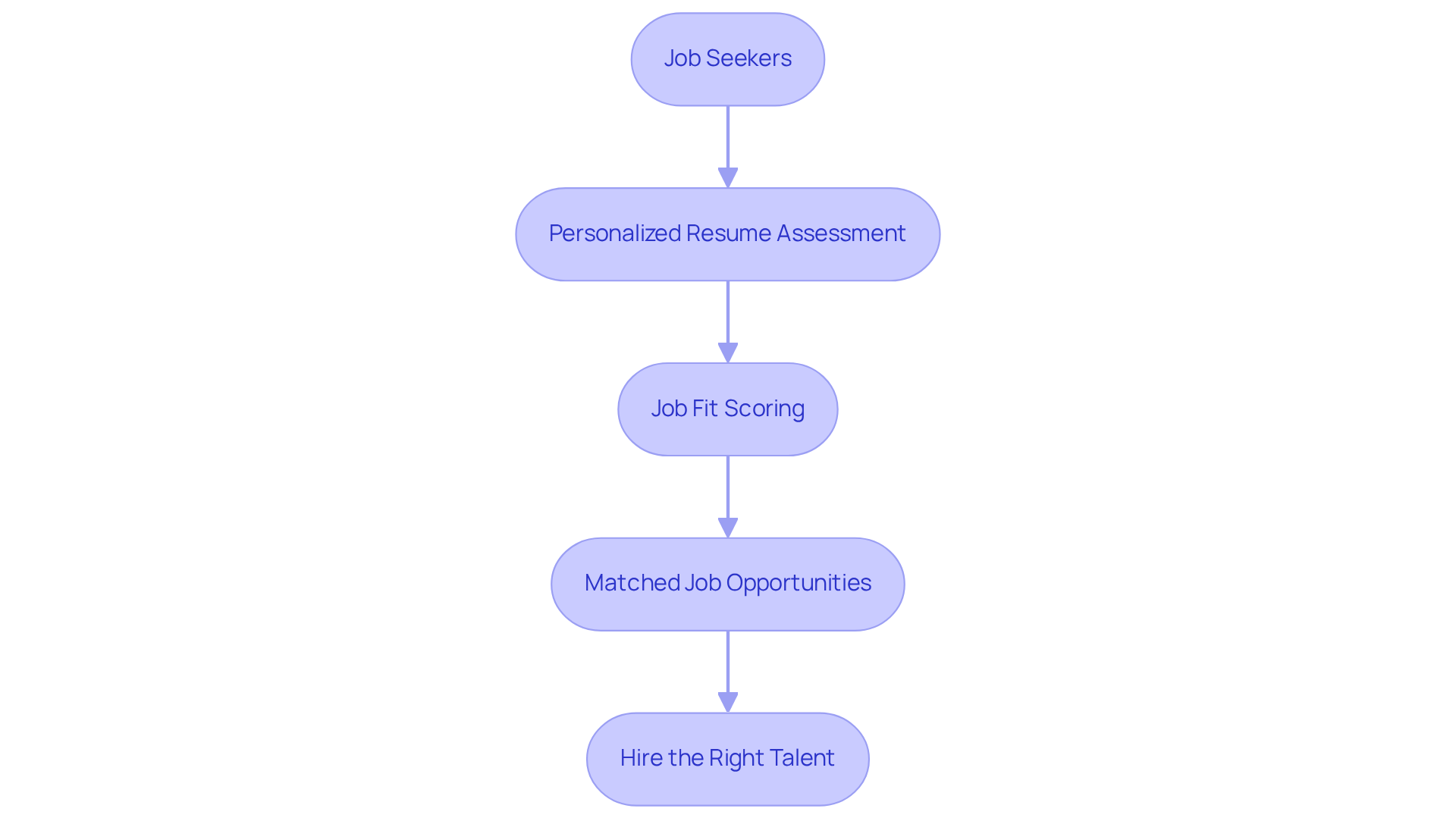
The demand for ABA therapists is projected to surge by 25% by 2026. This rise is primarily fueled by an increasing awareness of ABA therapy's effectiveness in addressing autism and various behavioral issues. Such a significant uptick highlights a robust job market for ABA therapist jobs, providing an excellent opportunity for Board Certified Behavior Analysts (BCBAs) to either enter or advance within this vital field.
Consider this: 1 in 36 children is diagnosed with autism spectrum disorders (ASD). This statistic underscores the to fill ABA therapist jobs. Additionally, the expansion of insurance coverage for ABA services and legislative mandates requiring educational institutions to provide these services enhance accessibility for families seeking support.
As the landscape of behavioral health continues to evolve, the demand for ABA therapist jobs grows, emphasizing the importance of strategic recruitment efforts to meet this rising necessity. The job listings for ABA therapist jobs have dramatically increased from 7,091 in 2017 to 16,109 in 2018, reflecting a strong job market. However, the sector still faces a considerable shortage of qualified professionals, particularly in ABA therapist jobs.
Are you facing challenges in hiring the right talent? Hire ABA can help bridge this gap, ensuring you find the qualified professionals needed to support families effectively. Don't miss out on the opportunity to enhance your team's capabilities—partner with us today.
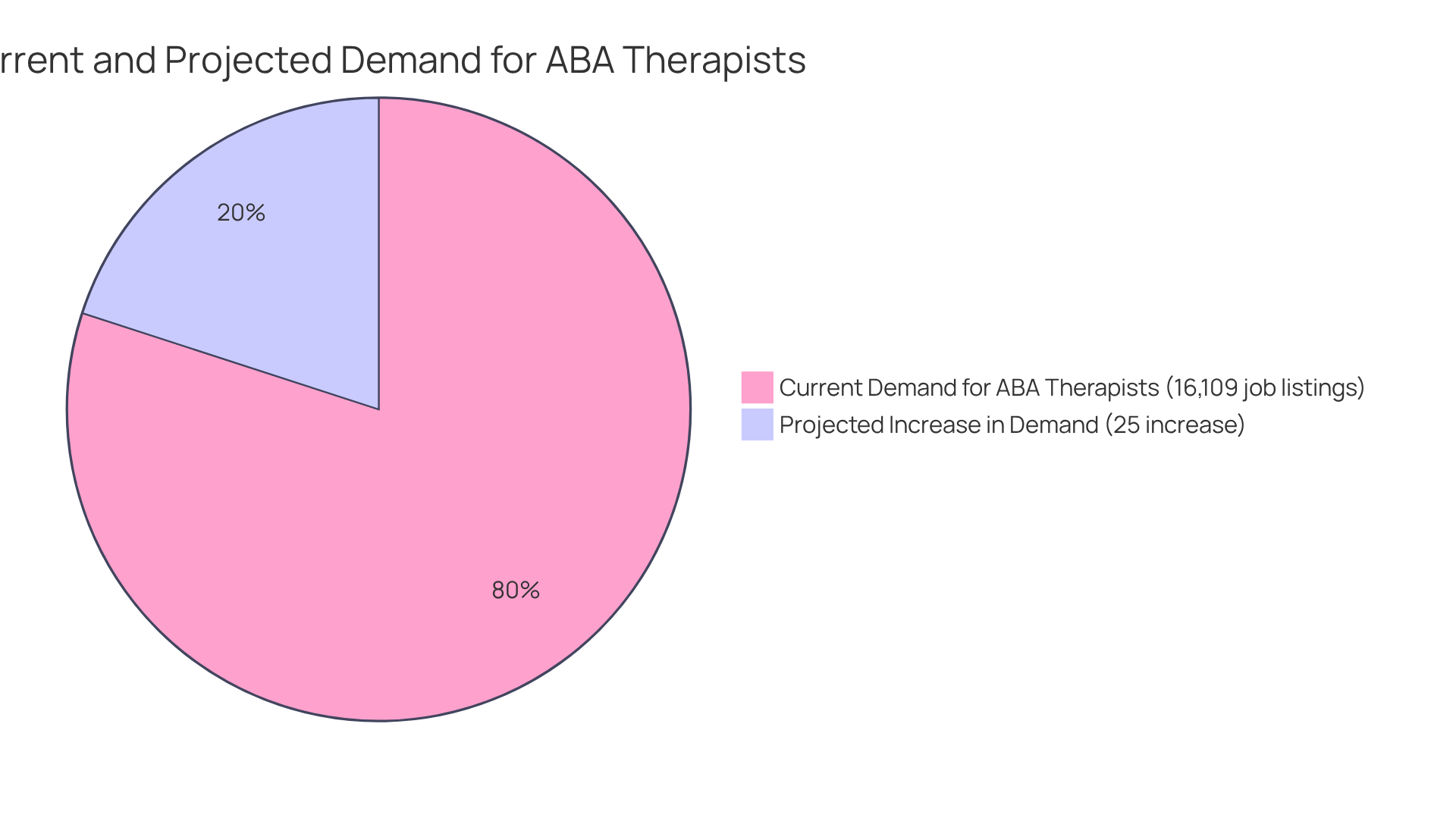
To meet the growing demand for (BCBAs), candidates must typically possess a master's degree in behavior analysis, psychology, or a related field. This educational foundation is crucial, as it equips candidates with the theoretical knowledge necessary for effective practice. Beyond academic qualifications, candidates are required to complete a specified number of supervised experience hours, providing practical, hands-on training under the guidance of a qualified BCBA. Subsequently, candidates must pass the BCBA certification exam, a comprehensive assessment that evaluates their understanding of behavior analysis principles and practices.
Continuous education is essential for behavior analysts. They must engage in ongoing professional development to retain their certification. This commitment to lifelong learning ensures that ABA therapists remain current with the latest research, techniques, and ethical standards in the field. The average time to complete BCBA certification, encompassing education and supervised experience, typically ranges from two to four years, depending on the individual's pace and program structure.
Educational institutions emphasize the importance of accredited programs, as graduates from these programs tend to have higher pass rates on the BCBA exam. In fact, first-time candidates from accredited programs achieved a pass rate of 67%, compared to lower rates for those from non-accredited programs. Successful educational programs for ABA therapist jobs not only focus on theoretical knowledge but also incorporate practical training and mentorship, effectively preparing candidates for the challenges they will encounter in their careers. As the need for skilled behavior analysts continues to rise—especially with an anticipated job growth rate of 22% from 2018 to 2028—the importance of strong training and certification routes for ABA therapist jobs cannot be overstated. Furthermore, the demand for behavior analysts surged by 1,942% from 2010 to 2018, underscoring the urgent need for skilled professionals in this field.
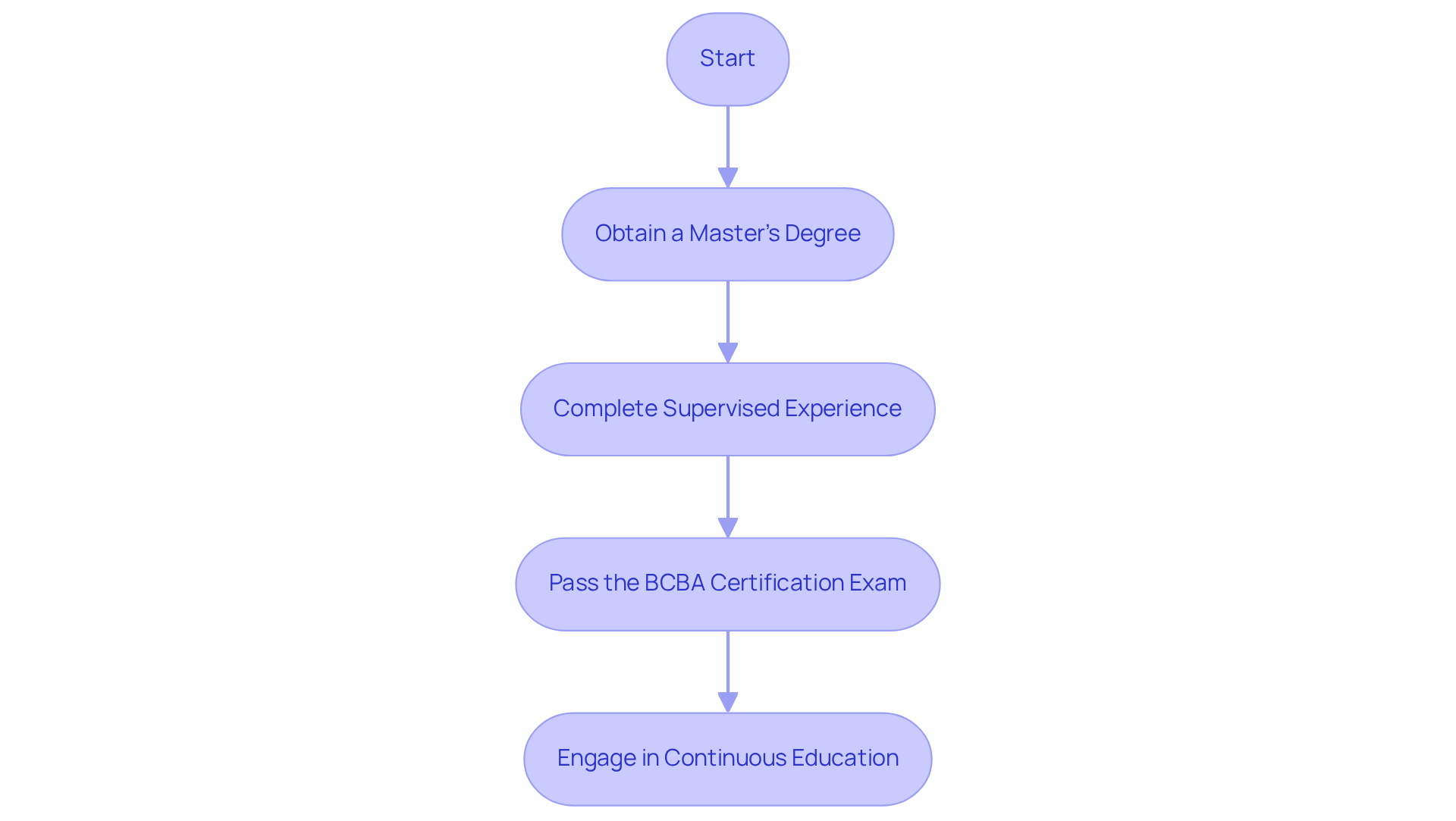
The salary landscape for ABA therapists and Board Certified Behavior Analysts (BCBAs) is significantly shaped by various factors, including experience, geographic location, and the specific work environment. Notably, entry-level ABA therapists typically earn between $40,000 and $50,000 annually. In contrast, the average salary for BCBAs is approximately $68,554, with experienced professionals commanding salaries exceeding $80,000. Some top earners can even reach upwards of $120,000, particularly in high-demand regions such as California and New Jersey.
Regional salary variations are substantial; for instance, BCBAs in New Jersey average around $95,532, while those in California earn approximately $84,000. The demand for services in specific regions also plays a crucial role in determining compensation. California, for example, accounts for 27% of the nationwide demand for assistant behavior analysts, reflecting its robust job market and influencing salary levels.
Moreover, additional certifications and specialized training can significantly enhance earning potential. Industry analysts emphasize that BCBAs with advanced degrees and specialized skills often experience substantial increases in their salaries. As of July 2023, the average salary for BCBAs is expected to be approximately $85,571, with numerous professionals earning between $70,000 and $89,500, depending on their experience.
Understanding these dynamics is essential for while navigating their career paths in ABA therapy. The right mix of experience, education, and regional requirements can greatly influence earning potential. Are you maximizing your recruitment strategy to attract top talent for ABA therapist jobs in this competitive field? Consider how Hire ABA can help you address these challenges effectively.
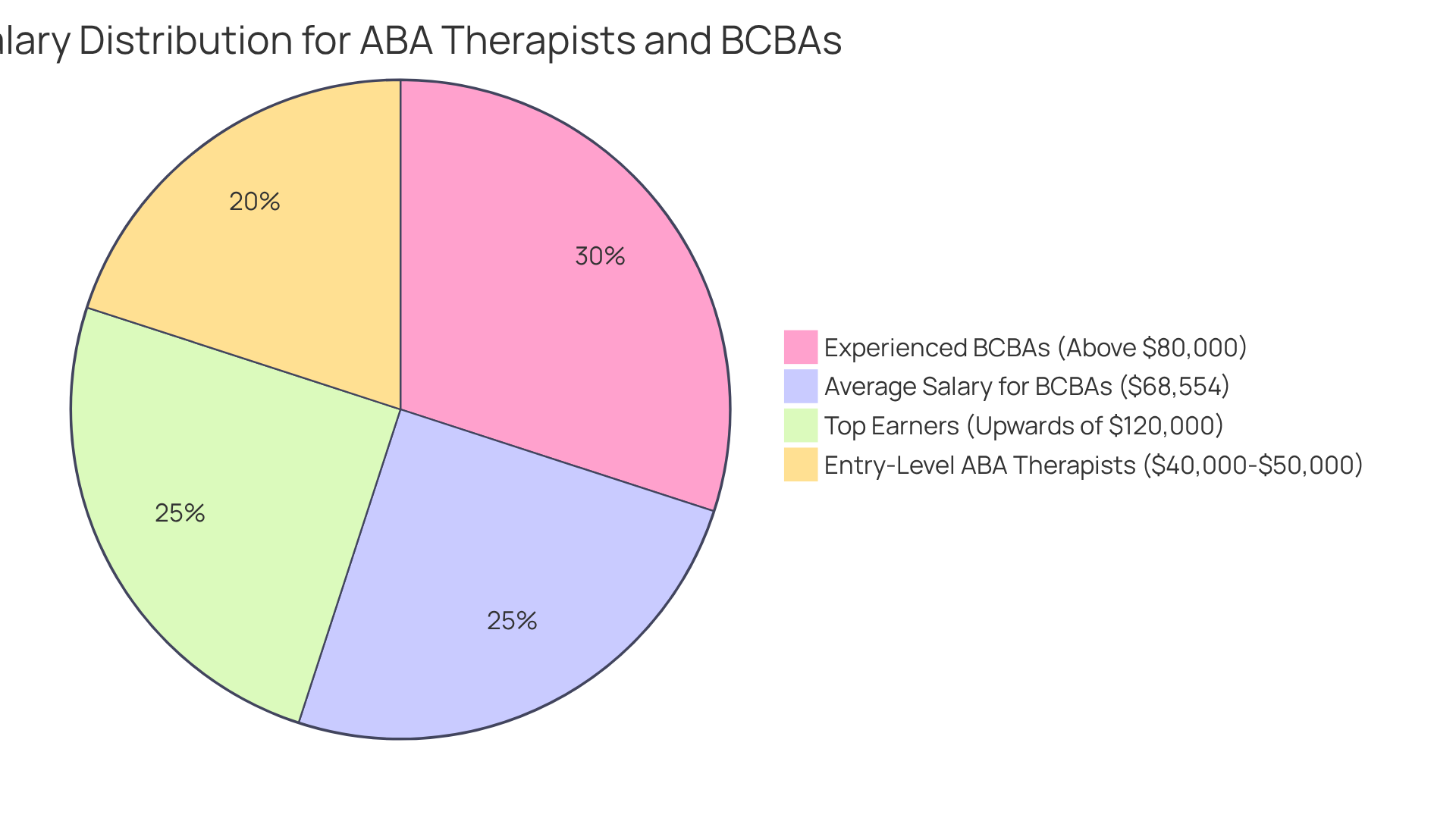
ABA therapist jobs encompass a broad spectrum of career pathways that extend well beyond traditional clinical roles. Did you know that as of 2023, around 30% of Board Certified Behavior Analysts (BCBAs) are involved in non-clinical positions? This statistic highlights the in various sectors.
Board Certified Behavior Analysts can find fulfilling positions in:
Specialized areas such as organizational behavior management and animal training also present unique opportunities. This diversity not only allows professionals to align their careers with personal interests and strengths but also reflects the increasing recognition of the importance of ABA across different fields.
The expansion of ABA therapist jobs into schools and corporate environments highlights the potential for career growth, making it an attractive option for those entering the profession in 2025. Are you facing challenges in hiring qualified professionals? Consider how Hire ABA can address these issues and connect you with top talent in the field.
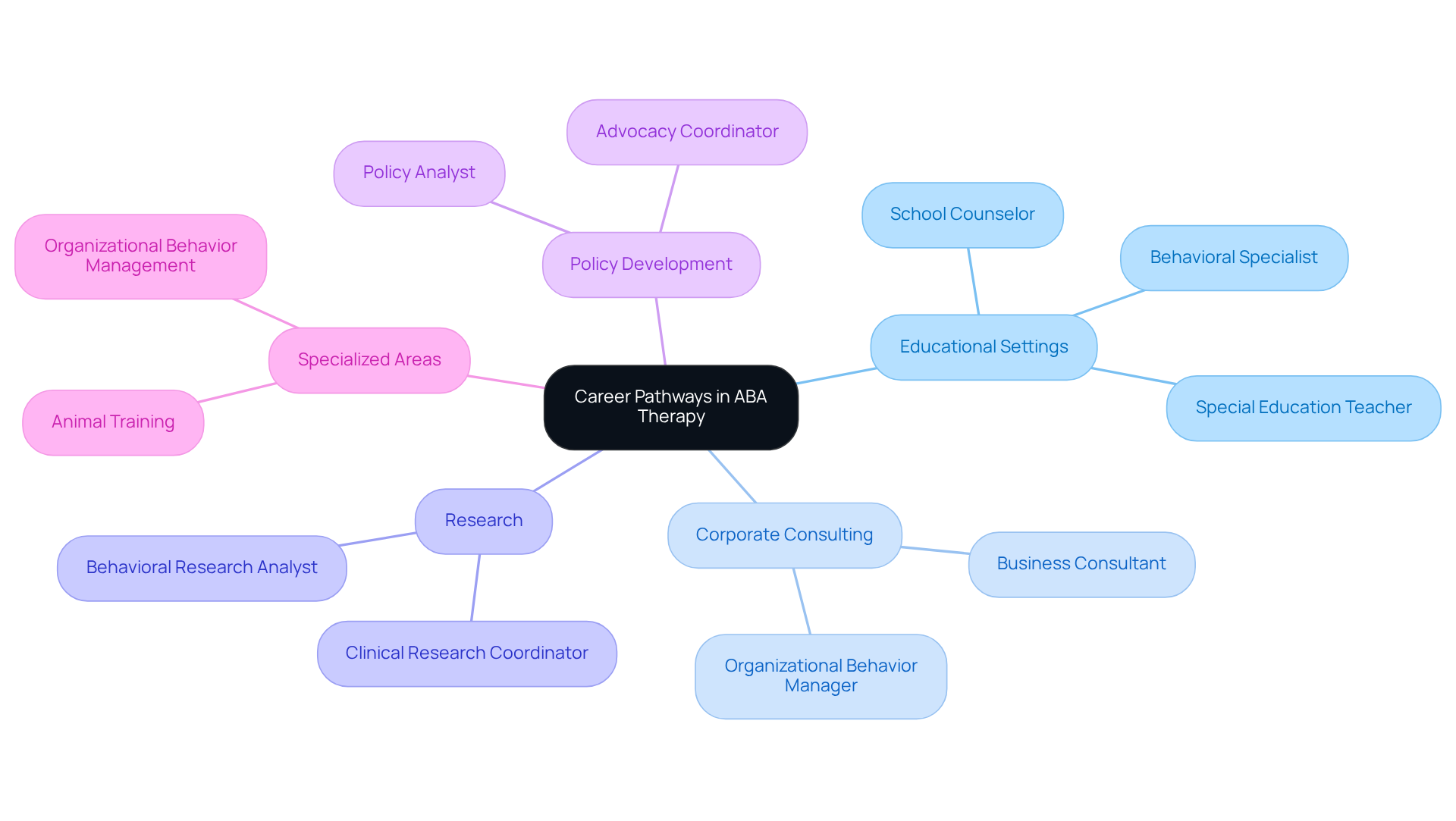
The availability of ABA therapist jobs exhibits significant regional variation. States such as California, Texas, Florida, and Georgia lead the way, driven by their larger populations and heightened awareness of ABA therapy's effectiveness. In 2023, California alone accounted for 18% of the national demand for Board Certified Behavior Analysts (BCBAs), while California, Massachusetts, Texas, Florida, and Georgia collectively represented 40% of the national requirement. This statistic underscores a in these regions. Conversely, rural areas may offer fewer job opportunities but often come with less competition, making them appealing for job seekers open to relocation.
As the need for BCBAs is projected to increase by 25% by 2026, and with a job growth rate for ABA therapist jobs expected at 14% from 2018 to 2028, understanding these regional trends is crucial for candidates looking to enhance their career prospects in ABA therapist jobs. By strategically focusing on high-demand areas, job seekers can substantially boost their chances of securing desirable ABA therapist jobs.
Are you currently facing challenges in hiring qualified professionals? The growing recognition of ABA as an effective treatment for various behavioral challenges is driving this demand, making it essential to consider how platforms like Hire ABA can assist in addressing these hiring needs.
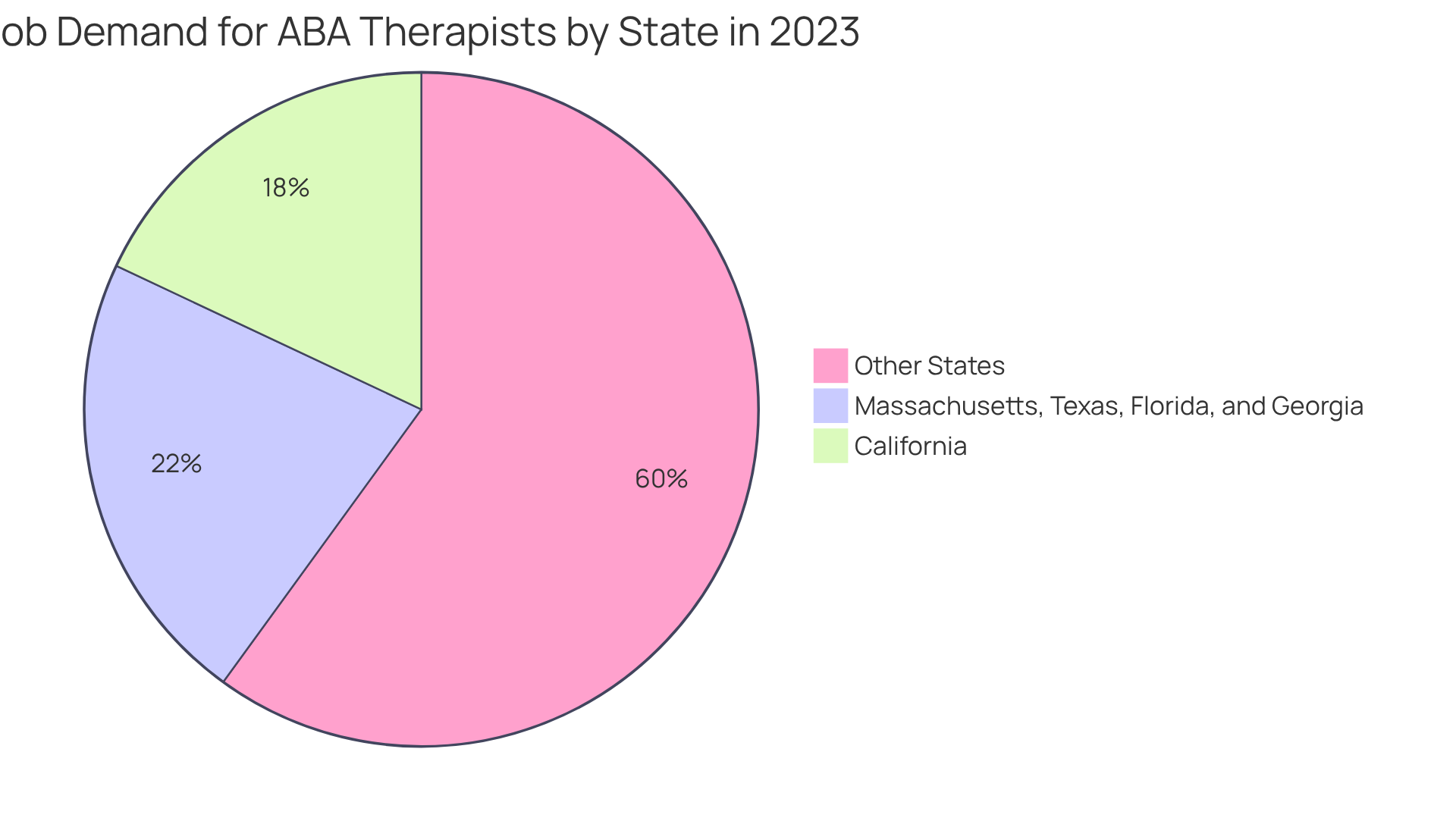
The demand for Board Certified Behavior Analysts (BCBAs) is projected to rise significantly by 2025, making the cultivation of essential skills in ABA therapy more critical than ever. Successful ABA therapists embody a distinctive combination of skills crucial for effective practice.
Empathy plays a vital role in understanding clients' needs, particularly for those on the autism spectrum. This understanding allows therapists to tailor interventions effectively, addressing individual challenges.
Furthermore, building rapport with clients and their families is essential for creating a supportive therapeutic environment. This rapport is linked to improved behavioral outcomes, reinforcing the importance of interpersonal skills in therapy.
As the demand for BCBAs rises, developing these skills will be crucial for achieving success in ABA therapist jobs. Are you ready to enhance your hiring strategies to meet this growing demand? Consider how Hire ABA can assist in connecting you with qualified professionals for ABA therapist jobs who embody these crucial skills.
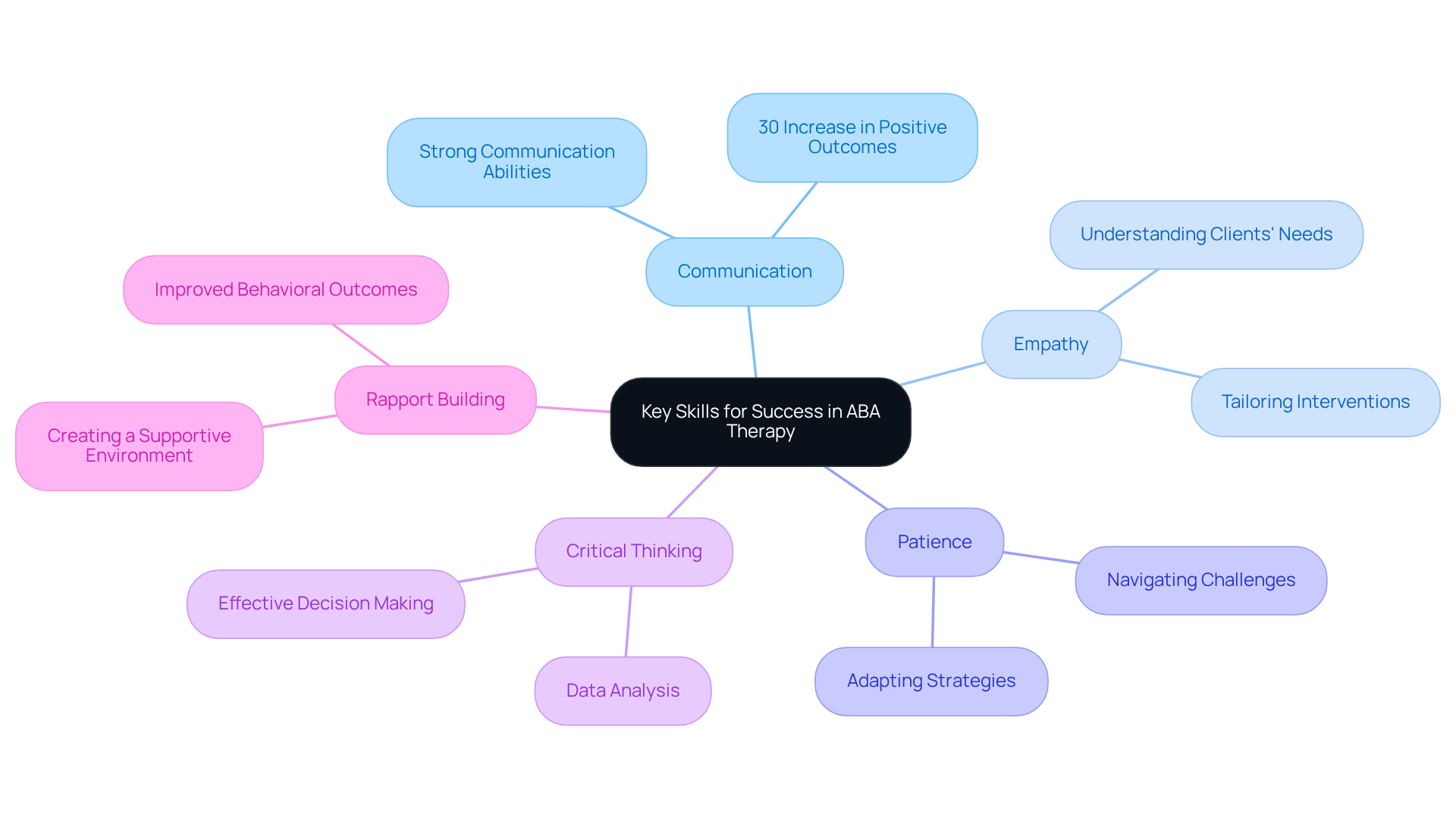
The rising prevalence of autism spectrum disorders (ASD) is a pivotal factor fueling the demand for Applied Behavior Analysis (ABA) services. Recent statistics reveal that approximately 1 in 31 children in the U.S. is diagnosed with ASD, marking a significant increase from previous years. This surge in diagnoses underscores the urgent need for more ABA therapist jobs to provide effective interventions tailored to the unique needs of these children.
Board Certified Behavior Analysts (BCBAs) are essential in this landscape, as they design and implement evidence-based strategies that notably enhance the quality of life for individuals with autism and their families. With the expected to rise by 25% over the next five years, new opportunities are emerging, often coupled with higher salaries, leadership roles, and flexible working conditions.
Case studies indicate that early and consistent ABA therapy can lead to substantial developmental gains, reinforcing the critical necessity for skilled professionals in this field. As autism diagnosis rates continue to escalate, the demand for ABA therapist jobs is projected to grow, emphasizing the importance of investing in training and resources for these vital roles within the healthcare system.
Are you facing challenges in hiring qualified ABA professionals? If so, consider submitting your resume to be among the first to learn about high-demand positions in ABA therapy.
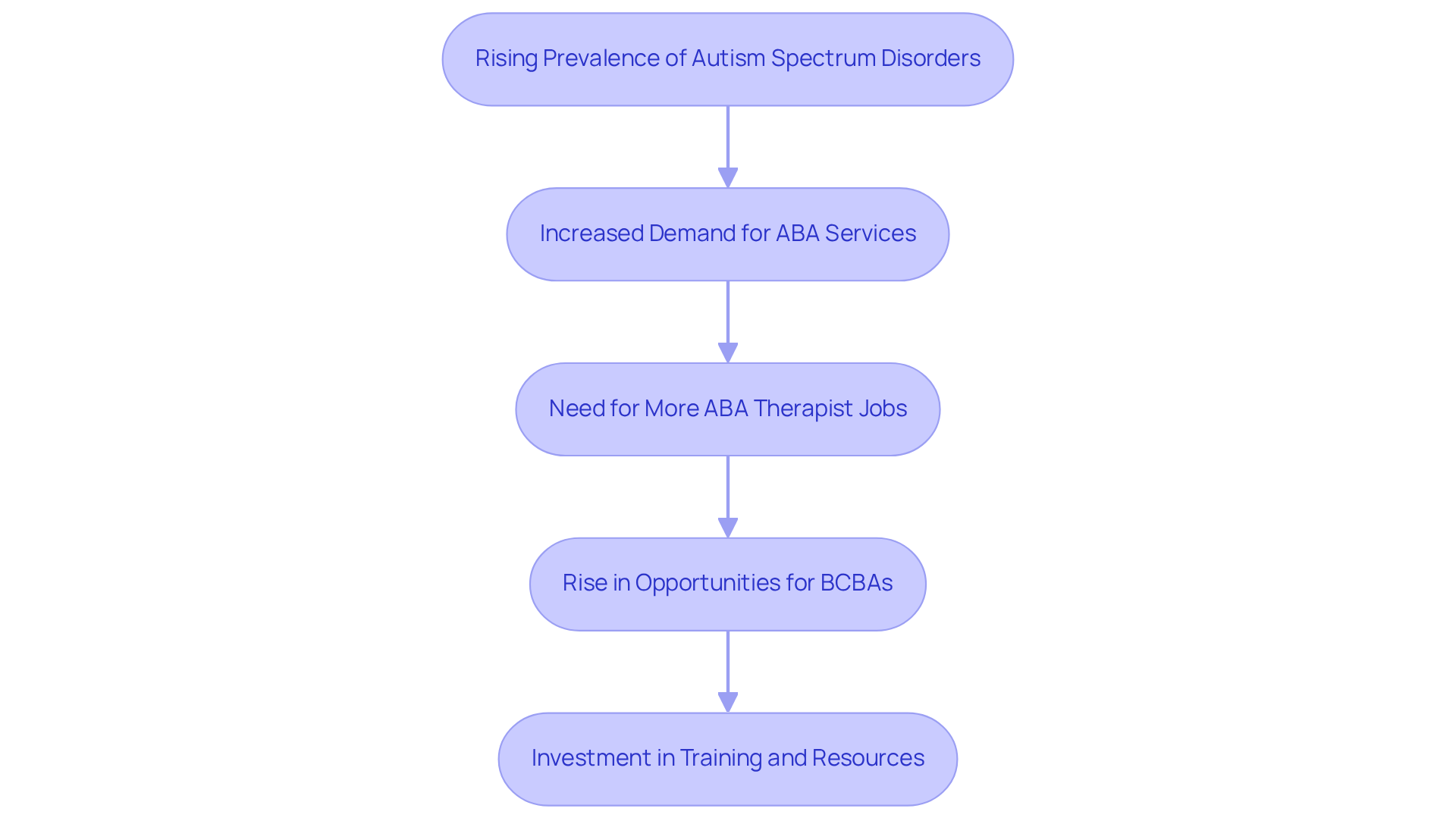
The landscape of ABA therapist jobs is evolving dramatically, particularly with the increasing in treatment delivery and data collection. Telehealth services are not just a trend; they are becoming essential, allowing therapists to effectively reach clients in remote areas. Furthermore, there is a significant emphasis on evidence-based practices and the utilization of data analytics to enhance treatment outcomes.
Professionals in the field must ask themselves:
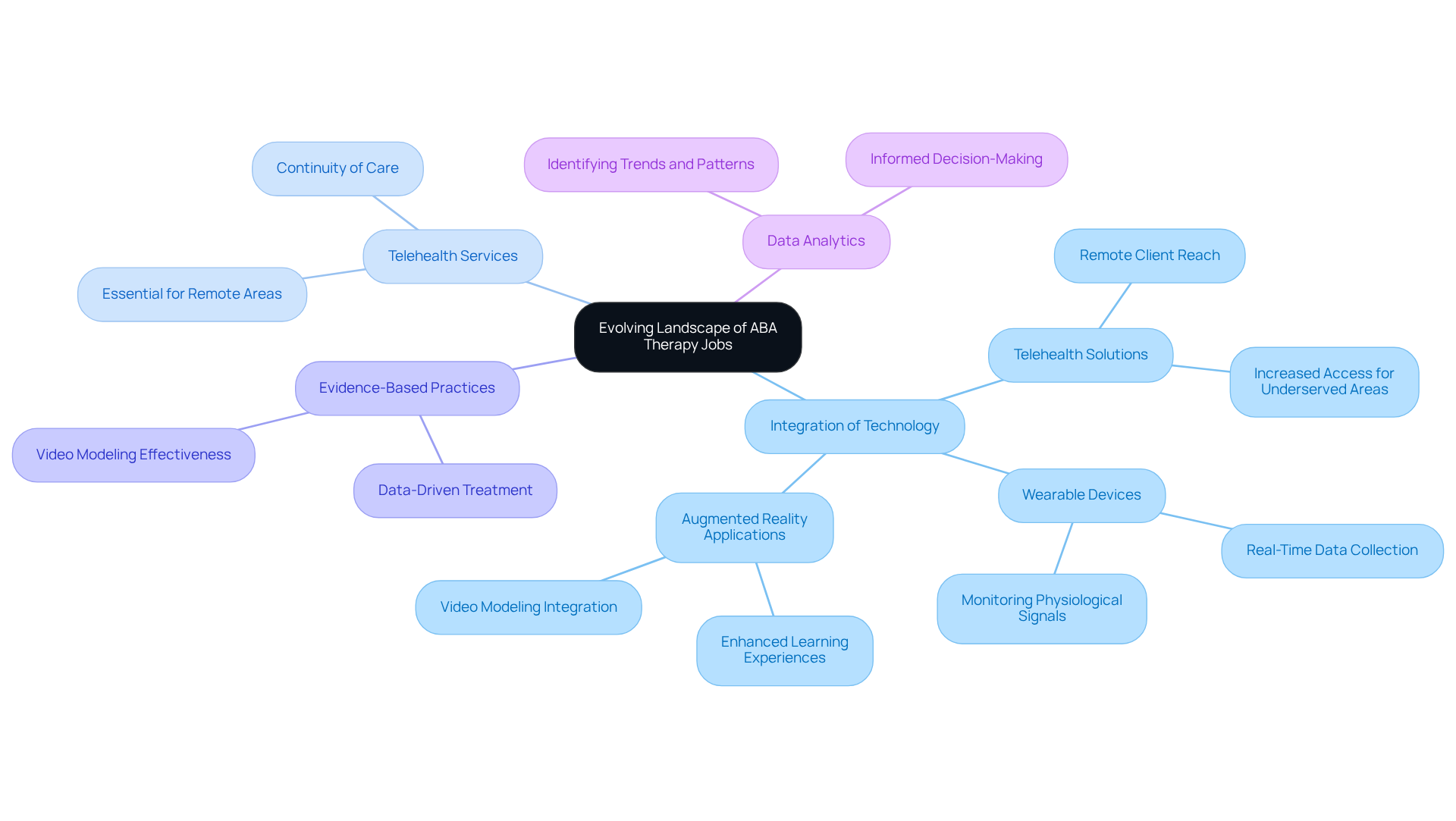
The financial landscape for ABA professionals is increasingly shaped by significant factors such as insurance reimbursement rates and funding for autism services. Did you know that the demand for Board Certified Behavior Analysts (BCBAs) is projected to increase by 25% by 2026? As awareness of Applied Behavior Analysis (ABA) therapy grows, a rising number of insurance companies are beginning to cover these essential services. This trend not only enhances job security for BCBAs but also opens the door to potentially higher salaries.
Typically, , with seasoned experts earning even more, particularly in states like California, where salaries can reach $90,000 to $100,000. However, navigating the complexities of billing and reimbursement processes remains a critical challenge. Accurate documentation and a thorough understanding of insurance policies are vital to ensure fair compensation for services rendered.
As the demand for ABA therapist jobs continues to rise, driven by increased autism diagnoses and expanded insurance coverage, professionals in this field must stay informed about the economic implications. Additionally, the potential impact of Medicaid cuts in Indiana presents significant challenges that ABA professionals must navigate in the current economic environment.
How prepared are you to address these challenges? Consider how leveraging a reliable recruitment platform like Hire ABA can help you secure ABA therapist jobs to thrive in this evolving landscape.
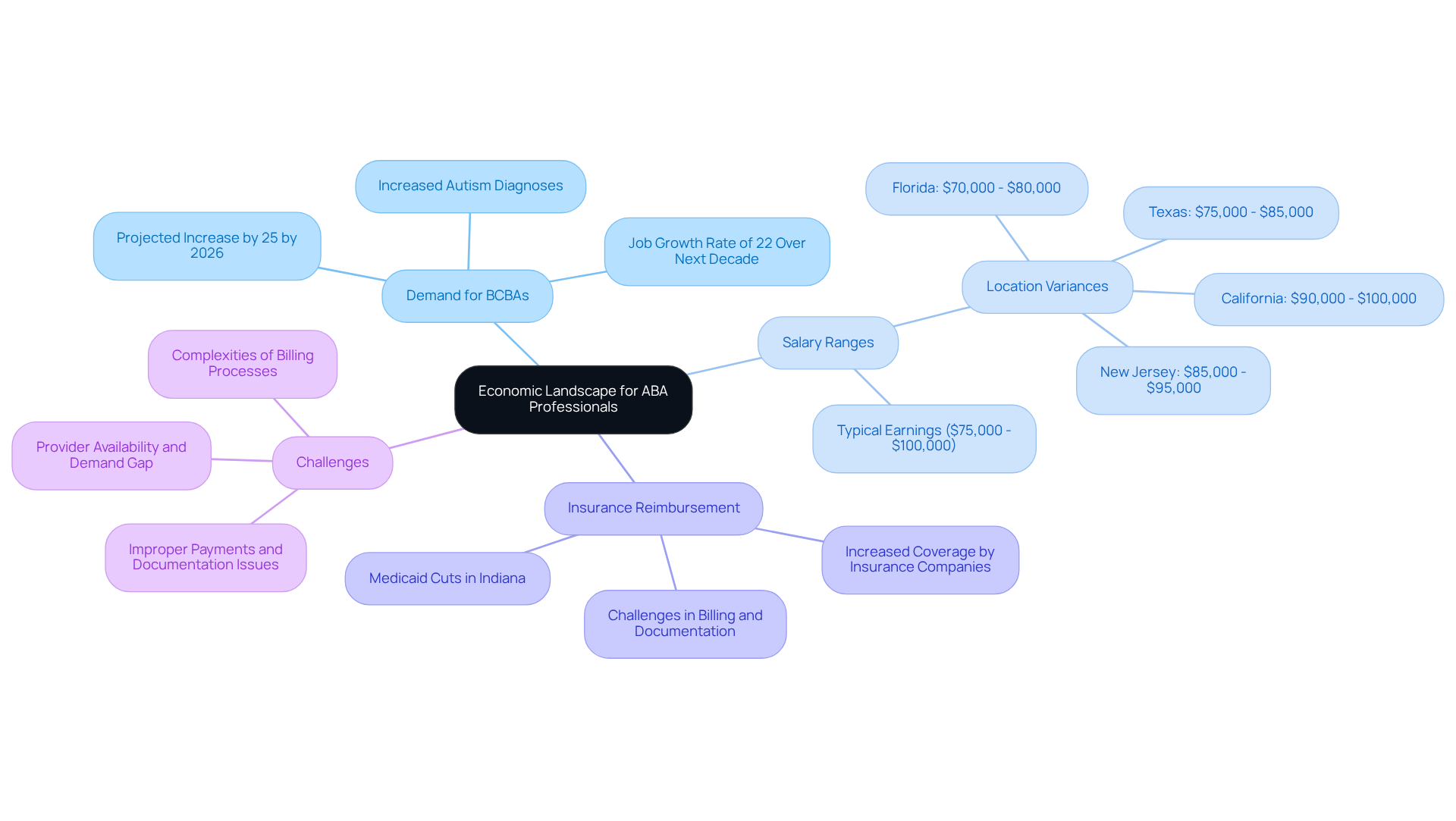
The landscape of ABA therapist jobs is poised for significant growth, with a projected 25% rise in job opportunities by 2026. This surge is driven by an increasing demand for qualified professionals crucial in supporting individuals with autism and various behavioral challenges. The need for Board Certified Behavior Analysts (BCBAs) has never been more pressing, underscoring the importance of effective recruitment strategies and signaling a promising future for those entering the profession.
Key insights reveal essential qualifications, salary expectations, and diverse career pathways available in ABA therapy. Understanding the rigorous training and certification requirements, alongside recognizing the economic factors influencing job availability, is vital for both job seekers and employers. Staying informed is imperative to navigate this evolving landscape successfully. Furthermore, the integration of technology and the expansion of ABA services into various sectors emphasize the dynamic nature of this field.
As demand for ABA therapists continues to rise, stakeholders must leverage resources like Hire ABA to enhance hiring practices and connect with top talent. Are you facing challenges in your current hiring efforts? By embracing these insights and trends, professionals can position themselves effectively within the job market, ensuring they meet the growing needs of individuals requiring ABA services. The future of ABA therapy is bright, and taking proactive steps today can lead to impactful changes for both practitioners and the families they serve.
What is Hire ABA and how does it benefit Board Certified Behavior Analysts (BCBAs)?
Hire ABA is a specialized recruitment platform designed to simplify the job search for BCBAs by connecting qualified candidates with premier job opportunities in the field of Applied Behavior Analysis (ABA) therapy. It uses advanced algorithms and a user-friendly interface to streamline the job matching process, saving time for job seekers and helping employers find the right talent efficiently.
What is the projected job growth for ABA therapists by 2026?
The demand for ABA therapists is projected to rise by 25% by 2026, driven by increasing awareness of ABA therapy's effectiveness in treating autism and behavioral issues. This growth indicates a robust job market for BCBAs, providing opportunities for both new entrants and those looking to advance in the field.
What qualifications are required to become a Board Certified Behavior Analyst (BCBA)?
Candidates typically need a master's degree in behavior analysis, psychology, or a related field, along with a specified number of supervised experience hours. They must also pass the BCBA certification exam, which assesses their understanding of behavior analysis principles and practices.
How long does it take to complete BCBA certification?
The average time to complete BCBA certification, including education and supervised experience, typically ranges from two to four years, depending on the individual's pace and the structure of their program.
Why is continuous education important for ABA therapists?
Continuous education is essential for behavior analysts to retain their certification and stay updated with the latest research, techniques, and ethical standards in the field. Ongoing professional development ensures that ABA therapists maintain their skills and knowledge throughout their careers.
What is the significance of accredited programs for BCBA candidates?
Graduates from accredited programs tend to have higher pass rates on the BCBA exam, with first-time candidates achieving a 67% pass rate compared to lower rates from non-accredited programs. Accredited programs focus on both theoretical knowledge and practical training, effectively preparing candidates for their careers.
How has the demand for behavior analysts changed over the years?
The demand for behavior analysts surged by 1,942% from 2010 to 2018, highlighting a significant increase in the need for skilled professionals in this field. The anticipated job growth rate for behavior analysts is 22% from 2018 to 2028, emphasizing the urgent need for qualified individuals.
Our expert recruitment strategies and AI-driven sourcing ensure that you receive top-notch candidates quickly, without compromising on quality. Whether you’re looking for BCBAs, Clinical Directors, or RBTs, we’ve got you covered.